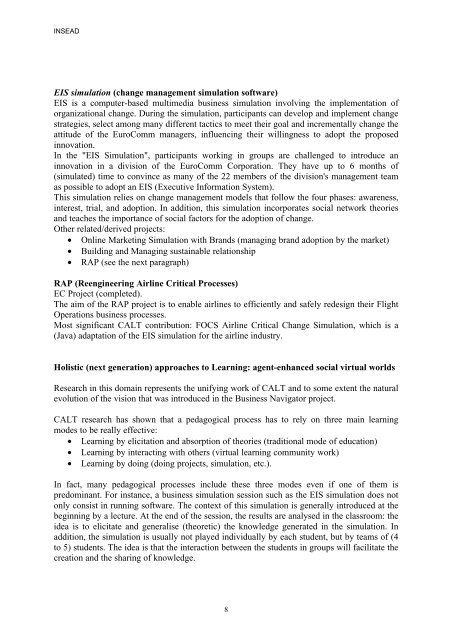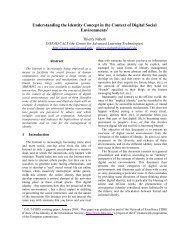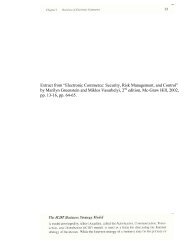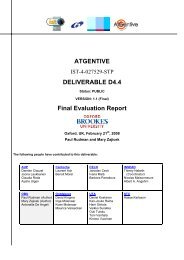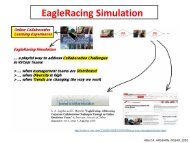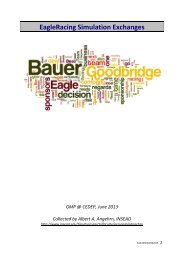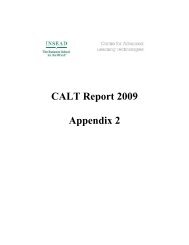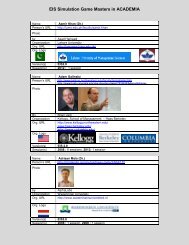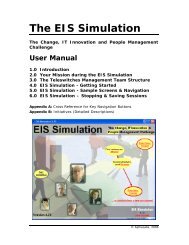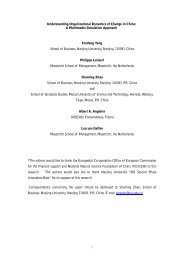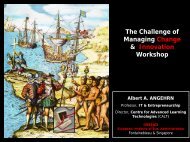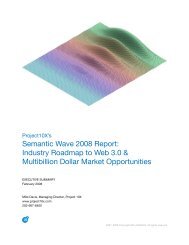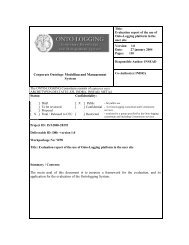Advanced Learning Approaches & Technologies ... - INSEAD CALT
Advanced Learning Approaches & Technologies ... - INSEAD CALT
Advanced Learning Approaches & Technologies ... - INSEAD CALT
You also want an ePaper? Increase the reach of your titles
YUMPU automatically turns print PDFs into web optimized ePapers that Google loves.
<strong>INSEAD</strong>EIS simulation (change management simulation software)EIS is a computer-based multimedia business simulation involving the implementation oforganizational change. During the simulation, participants can develop and implement changestrategies, select among many different tactics to meet their goal and incrementally change theattitude of the EuroComm managers, influencing their willingness to adopt the proposedinnovation.In the "EIS Simulation", participants working in groups are challenged to introduce aninnovation in a division of the EuroComm Corporation. They have up to 6 months of(simulated) time to convince as many of the 22 members of the division's management teamas possible to adopt an EIS (Executive Information System).This simulation relies on change management models that follow the four phases: awareness,interest, trial, and adoption. In addition, this simulation incorporates social network theoriesand teaches the importance of social factors for the adoption of change.Other related/derived projects:• Online Marketing Simulation with Brands (managing brand adoption by the market)• Building and Managing sustainable relationship• RAP (see the next paragraph)RAP (Reengineering Airline Critical Processes)EC Project (completed).The aim of the RAP project is to enable airlines to efficiently and safely redesign their FlightOperations business processes.Most significant <strong>CALT</strong> contribution: FOCS Airline Critical Change Simulation, which is a(Java) adaptation of the EIS simulation for the airline industry.Holistic (next generation) approaches to <strong>Learning</strong>: agent-enhanced social virtual worldsResearch in this domain represents the unifying work of <strong>CALT</strong> and to some extent the naturalevolution of the vision that was introduced in the Business Navigator project.<strong>CALT</strong> research has shown that a pedagogical process has to rely on three main learningmodes to be really effective:• <strong>Learning</strong> by elicitation and absorption of theories (traditional mode of education)• <strong>Learning</strong> by interacting with others (virtual learning community work)• <strong>Learning</strong> by doing (doing projects, simulation, etc.).In fact, many pedagogical processes include these three modes even if one of them ispredominant. For instance, a business simulation session such as the EIS simulation does notonly consist in running software. The context of this simulation is generally introduced at thebeginning by a lecture. At the end of the session, the results are analysed in the classroom: theidea is to elicitate and generalise (theoretic) the knowledge generated in the simulation. Inaddition, the simulation is usually not played individually by each student, but by teams of (4to 5) students. The idea is that the interaction between the students in groups will facilitate thecreation and the sharing of knowledge.8


